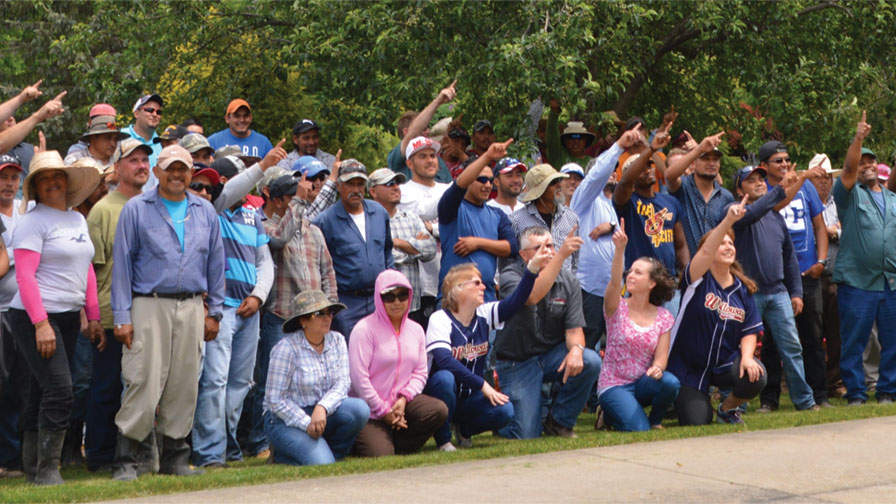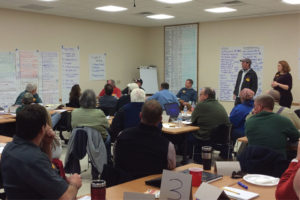How Willoway Nurseries Gets Its Staff Engaged in The Company’s Future
 Willoway Nurseries has always looked for new and innovative ways to improve efficiencies and better our products and services. At our operation, we faced the challenge of creating a new business culture that would work with the diverse education and language barriers for more than 400 employees. Our president, Tom Demaline, was looking for a way to improve communication, attract new employees, engage staff in making decisions, and take the company to the next level.
Willoway Nurseries has always looked for new and innovative ways to improve efficiencies and better our products and services. At our operation, we faced the challenge of creating a new business culture that would work with the diverse education and language barriers for more than 400 employees. Our president, Tom Demaline, was looking for a way to improve communication, attract new employees, engage staff in making decisions, and take the company to the next level.
Demaline came across a new philosophy of operating, called The Great Game of Business, that Jack Stack developed more than 30 years ago to help companies implement open-book management practices. In the early 1980s, Springfield Remanufacturing Corporation (SRC), a division of International Harvester, was near bankrupt when Stack took over and turned it around. He didn’t know how to manage a company, but he did know about the principles of athletic competition and democracy: keeping score, having fun, playing fair, providing choice, and having a voice. With these principles, he created his own style of management — open-book management.
Why Open-Book Management?
Many companies are looking for ways to keep everyone engaged in making their businesses successful. The open-book management concept gives everyone a better understanding of how business works, and everyone gets a stake in the game. It is called a game to make it fun. It gives staff the chance to be creative and encourages involvement and engagement in making improvements. Simply put, the process gives them a stake or ownership in the outcome.
Getting Started
Change needs to begin at the top, and you have to create a new culture of working openly as a team, or the process will not work. To start the game, everyone will need some business education to learn the rules of the game and the technical terms and processes. Staff receives training on basic things like how to understand input costs and profits, and how to read and comprehend a profit and loss statement. These tools provide the basis to make decisions or to offer better solutions for the future. Our ultimate goal at Willoway was to create a business of business-people who think, act, and feel like owners. This concept creates a culture of continuous improvement.
Creating a Vision
Many organizations confuse mission and vision. A mission is about who you are. Missions rarely change. Visions should be dynamic and consist of a drive of constant learning and innovation. Willoway gathered to have a high involvement planning meeting to start the process of creating a vision of what the company would look like in the future. We put sheets of paper on the walls and took down the key points that addressed the concerns of the crowd, and then created the vision and business plan in long- and short-term increments to move forward. The vision gives everyone a common goal to work toward and creates a stake in the game with measurable goals.
Measuring Progress
Every company has a critical number that will make it successful. We selected the profit before tax number, or PBT. This is the bottom line of the profit and loss statement. It is the start of the process to measure your progress and make decisions moving forward to work toward your vision. If it is not worth measuring, it is not worth doing. This also gives everyone a way to measure success, accountability, and ownership of his or her part of the profit and loss statement.
The goal is a focused, common mission that everyone can work to accomplish and that is easily communicated to track progress toward making the company more successful and profitable. This also allows employees to discover and understand exactly where these numbers are coming from and how their daily efforts drive those numbers.
 Communication and Engagement
Communication and Engagement
The next step is to improve communication and engagement through meetings called huddles. These brief daily or weekly department meetings are held to talk about daily progress, make adjustments, and get ideas from the group. This is called the wisdom of the crowd. We ask how can we make continuous improvement on day-to-day activities. Everyone has a chance to make improvements quickly and not wait until the figures are in and it is too late to make adjustments.
During our company huddles, we feel that it is important that employees have a voice and report their own numbers, which allows them to celebrate their successes and learn from their failures with the rest of the company.
We have developed scoreboards throughout the nursery to share weekly progress on the profit and loss statement and show how each person can make a difference in making improvements. We also meet company wide with a broadcast meeting of more than 400 employees in eight locations to talk about that progress. Through this process, employees develop accountability for their part of the game, receive recognition for a job well done, and get the wisdom of the crowd for ideas on how to make a change.
The Stake in the Game
The Great Game of Business is about keeping the company healthy and profitable, and providing the staff with a future for satisfying long-term employment. To increase the stake, the owners offer one more chance for recognition of success that is based on the critical number (PBT or profit before taxes). The company has agreed to share a percentage of the profit from the bottom line with each employee. This keeps everyone engaged and trying to make improvements to give them a stake in the outcome and the future of the company.
 The Journey Continues
The Journey Continues
The game is a journey, and it is never really over. At Willoway Nurseries, the staff has improved communications and works together toward the common goal of our critical number and our vision for the future. We are all engaged in providing the best possible products and services for our customers.
What are Mini Games?
Mini games help you make changes or improvements on the fly. Keeping with the game-like concept, you develop a goal, communicate that goal, and then earn a prize for achieving the goal. Goals need to be short, measurable, and sustainable. They should address the overall goal of achieving the critical number. For example, we play a mini game at Willoway Nurseries measuring the percentage of plants sold versus plants shipped. If we hit the target in a two-week period, then we earn a reward, such as a company breakfast on Friday after our company huddle.
A group of representatives from every department selects the prizes to give everyone a chance to have a voice and a stake in the outcome of the mini game. The reward selections can vary, and they have evolved to selecting prizes like supporting charities and community involvement.









